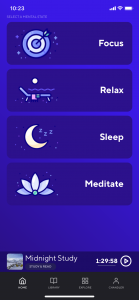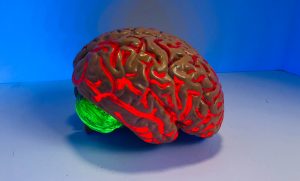Brain FM Review
This is a Brian FM review of their music streaming service and its potential for those of us with ADHD.
How I work and listen to music.
Within the programming community, having a good computer is synonymous with having an equally high-quality set of headphones. It’s almost a cliche, the image of a programmer in front of a set of dual monitors, wearing their headphones, with their minds sunk deep into a mental trance.
I admit, I’m a programmer, and I am writing this article in front of two monitors with my headphones on. They are good headphones, and I’m a bit embarrassed about how much money I spent on them.
However, I am firmly convinced that my concentration skyrockets when I listen to the right music while I work. It’s definitely not the same with all music. Personally, I listen to instrumental, rhythmic, and electronic music while working. Some of my favorite genres are Deep Tech, Chillstep, and Melodic Progressive.
My particular electronic music favorites work well for me because they tend to have repeating rhythms and no lyrics. It’s a bit of a buzzword right now, but these genres can create mental flow. Flow is a term from psychology that describes a mental state with high concentration, clear focus, positive energy, and high task engagement.
A quick primer on ADHD.
I was also diagnosed with ADHD in the early 80s. So, low short-term memory, short attention span, and high distractibility have always been a struggle.
ADHD is a neurological developmental disorder that affects the prefrontal cortex and causes low levels of specific neurotransmitters. Those neurotransmitters are primarily dopamine and norepinephrine, which carry signals to the prefrontal cortex to utilize the brain’s executive functions.
Executive functions are the brain’s ability to analyze incoming information in a top-down method. This top-down cognitive method is utilized in prioritizing which incoming stream of information is essential at the current moment. In essence, our executive functions help us pay attention and ignore distractions.
Why music can help us focus.
A research paper published in the Psychological Research journal in 2020 found a statistically significant correlation related to listening to background music while performing a sustained task (Kiss, Linnell, 2020). The study showed that listening to background music while working on a task that required sustained attention led to increased focus and decreased mind-wandering.
Another study published in 2012 by the Department of Occupational Therapy, Fu Jen Catholic University, found that background music without lyrics led to greater worker attention and performance than music with lyrics. The paper’s authors, Shih, Huang, and Chiang, propose that when measurably compared, music without lyrics leads to better worker performance than music with lyrics.
Having shown the positive effects of instrumental music without lyrics for attention and performance, which music streaming service is the best?
Brain FM Review. The science.
In this Brain FM review, I’m going to take a close look at the music service that is arguably the largest player in this niche music market. To achieve its current market position, Brain FM uses a well-developed scientific model to develop its music for focus.
The first goal of Brain FM’s model is to decrease distractions. To do this, they produce music that is intentionally designed to sit in the background. Brain FM’s music is specifically created to avoid musical elements that might grab your attention.
The result of Brain FM’s science is music that keeps your mind engaged on a task without causing your mind to focus on the music. The music stays in the background, keeping you focused on a task and avoiding any distractions.
This first goal from Brain FM is consistent with the research from Shih, Huang, and Chiang that suggests that music without lyrics will lead to better performance.
Brain FM reviews and uses controlled studies to measure this goal of distraction reduction. Specifically, they use EEG and brain fMRI imaging. EEG, electroencephalography, measures electrical signals produced by the brain. Brain fMRI, functional magnetic resonance imaging, is brain scan imaging that shows neural activity. Both EEG and brain fMRI are highly efficient tools for measuring brain function (Mulert, 2013).
As Brian FM‘s website states, the EEG and brain fMRI study results are used to measure the “Phase Locking Value” of different types of sound. Essentially, Phase Locking measurements indicate the level of neural synchronicity while listening to sound. Neural synchronicity and oscillations can lead to optimal phase concentration, which is optimal for processing information (Breska, Deouell, 2017).
To demonstrate how well Brain FM creates optimal neural oscillations, their website includes a study by Dr. Psyche Loui and MIND Lab at Wesleyan University. The study shows that, compared to Spotify, silence, and pink noise, Brain FM’s specially designed music elicits increased Phase Locking and neural oscillations (Loui, Wesleyan University).
Brain FM‘s second goal is to uniquely combine AI, science, and musicians to create streams of music that are both scientific and uniquely human. This goal can’t be measured and quantified like the first goal.
The full Brain FM service.
In all, Brain FM has 18 Focus channels, 10 Relax channels, and 8 Sleep channels. This is in addition to the preset music for each mental state of Focus, Sleep, Relax and Meditate. Additional special selections exist for Deep Work, Creative Flow, Study and Read, and Light Work within the Focus category. There are also additional special selections for Chill, Recharge, Destress, and Unwind within the Relax category. Within the Meditate category, there are additional special selections for Unguided and Guided Meditation.
Some examples within Brain FM’s Focus channel include:
- LoFi Focus
- Classical Focus
- Atmospheric Focus
- Beach Focus
- Chimes & Bowls Focus
- Drone Focus
- Electronic Music Focus
- Forest Focus
- Grooves Focus
- Nightsounds Focus
- Piano Focus
- Rain Focus
- Relaxed Focus
- Study Focus
Although I have focused this article on Brain FM’s concentration music for those of us with ADHD, the Meditate and Relax channels can be equally important for managing ADHD. With the anxiety and stress that often accompanies ADHD, both the Relax and Meditate channels can be of immense help.
My Brain FM review experience.
I have been working on this Brain FM review article for the last four hours. During that whole time, I have been listening to Brain FM. Specifically, I have been listening to their “Deep Work” channel.
Honestly, Brain FM just works. I always listen to music while working, but Brain FM is optimized specifically for this reason. It has kept my work session productive. Brain FM’s music has also reduced my distraction while remaining in the background of my mind. But, of course, this is precisely what Brain FM designed its music to do.
Brain FM is definitely on par with the music I normally listen to while working. The key with Brain FM is that you can explore their music options without the risk of picking a bad music station. With other music services, it’s a trial-and-error process. I try an album, and if it works well for my concentration, I’ll add it to a playlist. With Brain FM, this process has already been done for you. You can be reasonably assured that the music will perform well as concentration music.
I would describe the music as engaging enough to keep my attention on my task, but not distracting enough to cause me to stop and listen to the music. The particular “Deep Work” channel I am listening to is fast-paced electronic music that I find energetic, to the point that it keeps my concentration flowing at a fast and constant pace. This “Deep Focus” channel is definitely generating an increase in my work pace and productivity while I am writing this Brain FM review.
For me, Brain FM performed well. The music rarely caught my attention. Instead, the music was a constant, wordless rhythm that kept me engaged and on-task.
I would even venture to say that Brain FM’s music had me in an induced hyperfocus session. ADHD already tends to create hyperfocus. However, this music is optimized for hyperfocus.
Also, because of Brain FM’s wide selection of music, I was able to find an electronic music channel for focus that I preferred. I specify focus because their music streaming app works for more than just focus. They also have music specifically designed for relaxing, sleeping, and meditating.
Final Verdict.
What’s important to remember about Brain FM is that it is purpose-driven music. It is designed to achieve specific mental states. So, it won’t replace Apple Music for general use. When you hit the streets for an afternoon jog, you’ll still need Apple Music to play the best ’90s workout songs.
So, when you have a goal in mind, and the task is more important than the music, then Brain FM can provide the perfect music to help you achieve your goal. For less important times, you’ll still use Apple Music for listening to the best 90’s grunge bands.
I signed up for a 3-day trial to write this Brain FM review. This is a great way to try out this music service and see if you experience an increase in focus and productivity. Because the trial is only for three days, I would sign up on Thursday of any week. That way, you would have two days to test out the music at work, and the remaining day to test on the weekend. Over the weekend, you could test out the Relax and Meditate channels.
Here is a link to try out the Brain FM music streaming app. After using this app for several hours, while concentrating on writing this article, I can easily say that the Brain FM music streaming service is worth at least a trial to test out the service.
Based on my personal experience with writing this Brain FM review while listening to Brain FM, I feel confident in recommending this service.
Writing this Brain FM review was much easier with Brain FM playing on my Bose NC 700 headphones. For a dive into noise-canceling headphones, take a look at this article.
Their pricing is $6.99 monthly or $49.99 yearly. Using this coupon code, “TheADHDLifestyle,” you can get a 20% discount on a subscription to Brain FM.
Citations:
Kiss, Luca, and Karina J. Linnell. “The Effect of Preferred Background Music on Task-Focus in Sustained Attention.” Psychological Research, vol. 85, no. 6, Springer Berlin Heidelberg, 2020, pp. 2313–25, https://doi.org/10.1007/s00426-020-01400-6.
Mulert, Christoph. “Simultaneous EEG and fMRI: towards the characterization of structure and dynamics of brain networks.” Dialogues in clinical neuroscience vol. 15,3 (2013): 381-6. doi:10.31887/DCNS.2013.15.3/cmulert
Shih, Yi-Nuo, Huang, Rong-Hwa, and Chiang, Hsin-Yu. ‘Background Music: Effects on Attention Performance.’ 1 Jan. 2012: 573 – 578.
Breska A, Deouell LY (2017) Neural mechanisms of rhythm-based temporal prediction: Delta phase-locking reflects temporal predictability but not rhythmic entrainment. PLoS Biol 15(2): e2001665. https://doi.org/10.1371/journal.pbio.2001665
This post may contain affiliate links that earn us a commission when you buy through our product links. For our full disclosure, please visit our Privacy Policy page.










